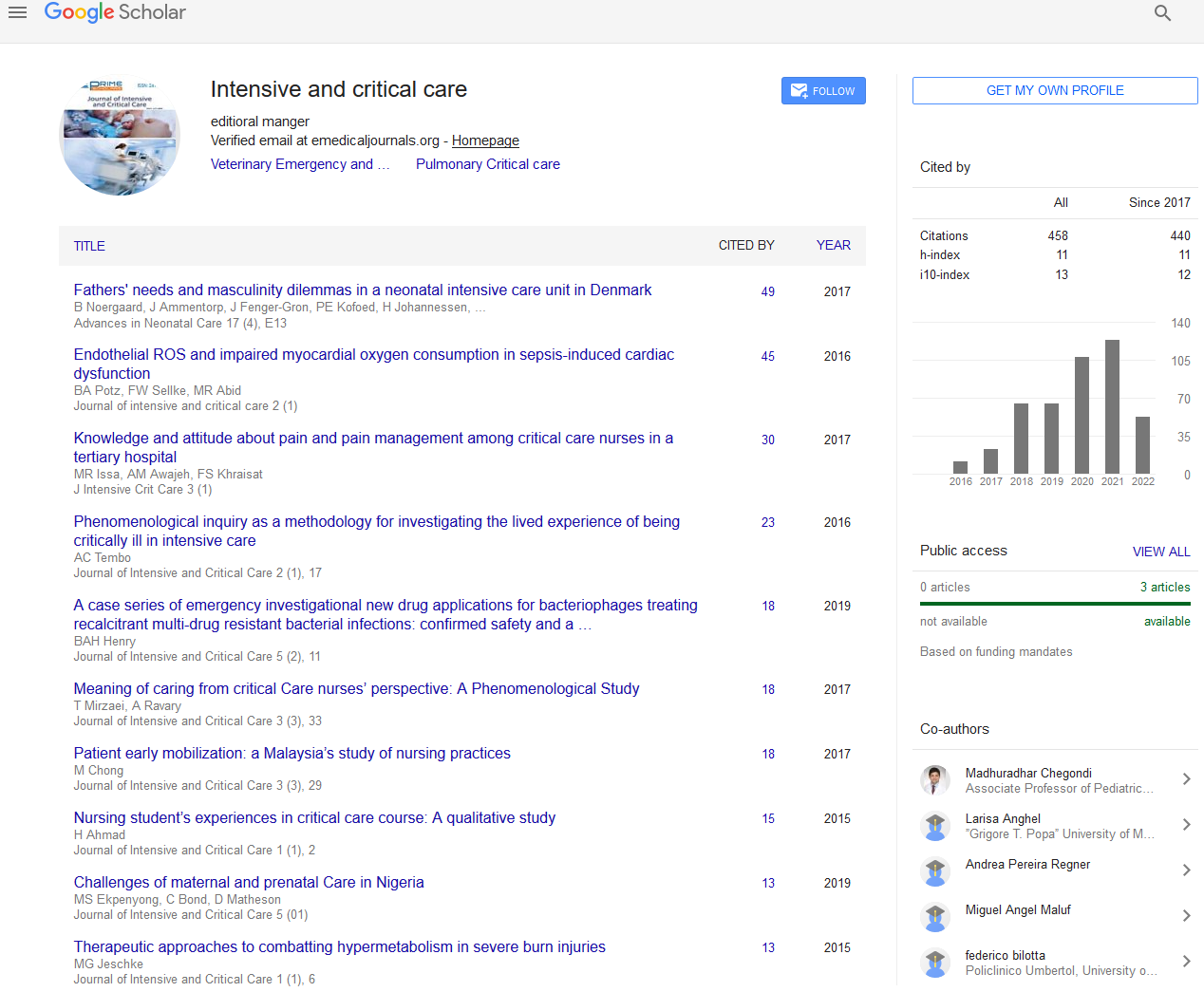Opinion - (2023) Volume 9, Issue 6
Relative Adrenal Inadequate within the Grown-up Burn Seriously Care Unit
Gul Sher*
Department of Critical Care, University of Arizona College of Medicine, USA
*Correspondence:
Gul Sher,
Department of Critical Care, University of Arizona College of Medicine,
USA,
Email:
Received: 29-Nov-2023, Manuscript No. IPJICC-23-18687;
Editor assigned: 01-Dec-2023, Pre QC No. IPJICC-23-18687 (PQ);
Reviewed: 15-Dec-2023, QC No. IPJICC-23-18687;
Revised: 20-Dec-2023, Manuscript No. IPJICC-23-18687 (R);
Published:
27-Dec-2023, DOI: 10.35248/2471-8505-9.6.59
Introduction
The combination of specialized expertise, advanced wound
care, infection prevention, and comprehensive care has led to
improved survival rates for burn patients. BICUs have made it
possible for individuals with severe burns to recover and regain
a high quality of life, even in cases that might have been fatal in
the past. Burn Intensive Care Units have transformed the landscape
of burn injury treatment. Their specialized expertise, advanced
techniques, and holistic approach to patient care have
revolutionized the way burn injuries are managed, leading to
better outcomes and improved quality of life for survivors. As
we continue to advance in the field of burn care, BICUs will play
a central role in shaping the future of burn injury treatment.
Their dedication to the physical and emotional well-being of
patients ensures that burn survivors have the best chance of
recovery and restoration. In the journey of burn recovery, Burn
Intensive Care is a beacon of hope, helping individuals heal
and reclaim their lives in the face of adversity. Compared to
other areas of medicine, burn care has received relatively less
research attention and funding. This results in limited innovations
and therapeutic advancements in the field of burn treatment.
Burn ICUs often struggle with outdated techniques and
equipment, hindering their ability to provide the best possible
care to patients.
Description
Burn Intensive Care Units are essential for the treatment of severe
burn injuries, but they are not without their drawbacks.
High costs, infection risks, emotional trauma, and limited
availability of specialized facilities are just a few of the challenges
patients and healthcare professionals face in burn care.
Addressing these drawbacks requires a concerted effort from
healthcare systems, policymakers, and the medical community
to improve burn care and enhance the quality of life for burn
survivors. While the drawbacks are significant, the dedication
and expertise of healthcare providers in Burn ICUs remain crucial
in helping patients on their journey to recovery. Surgical
critical care is a dynamic and essential field of medicine that offers
countless benefits in treating critically ill patients. Its multidisciplinary
approach, rapid response to trauma, and expertise
in complex surgical procedures are just a few of the advantages
it brings to modern healthcare. The life-saving and life-improving
aspects of surgical critical care highlight its crucial role in
providing patients with the best possible chances of survival
and recovery. As the field continues to evolve and adapt to new
challenges, its impact on patient outcomes will only become
more significant. These ethical dilemmas can be emotionally
taxing for healthcare professionals, patients, and their families.
Conclusion
Surgical critical care is a vital component of modern healthcare,
saving lives and providing essential support to patients
during their most critical moments. However, it is essential to
acknowledge and address the drawbacks and challenges associated
with this specialized field. High costs, resource allocation
issues, overutilization, healthcare-associated infections,
psychological and emotional impacts, physician burnout, and
ethical dilemmas are all areas that demand attention and improvement.
To enhance surgical critical care, healthcare institutions
must focus on cost-effective strategies, better resource
allocation, the prevention of healthcare-associated infections,
and the provision of psychological support for patients and
their families.
Citation: Sher G (2023) Relative Adrenal Inadequate within the Grown-up Burn Seriously Care Unit. J Intensive Crit Care. 9:59.
Copyright: © 2023 Sher G. This is an open-access article distributed under the terms of the Creative Commons Attribution License, which permits unrestricted use, distribution, and reproduction in any medium, provided the original author and source are credited.

